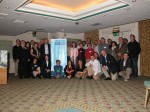3rd Sea Alarm Conference (2004)

Sponsors: Fairy, ITOPF, WWF, Fingal County Council, the Heritage Council, National Car Hire and Dublin Port
Date: 1- 3 November 2004
Venue: Balbriggan, Ireland
Publications: Third Sea Alarm Conference – Proceedings
A total of 26 organisations, ranging from wildlife response organisations, industry, and governmental organisations, from eight European countries gathered to discuss how greater preparedness for oiled wildlife responses could be achieved in Europe. The new IPIECA Guide for Oiled Wildlife Response Planning was launched and a list of recommendations was produced, entitled the Balbriggan Declaration.
Balbriggan Declaration
Marine wildlife knows no national boundaries and the welfare of birds and sea mammals in the event of a spill is the responsibility of all countries. It is also a primary interest to the media, often influencing the public’s perception of the effectiveness of the government’s response. Within Europe, wildlife response usually relies on the dedication of individuals and volunteer groups within the local community. However, these often lack the resources and, in some cases, the experience, to mount a prompt response by themselves.
To improve this situation the conference strongly urges that:
- Plans for wildlife response should be developed and integrated into existing local, national and regional contingency plans and arrangements for responding to spills of oil and other substances within European waters.
- The IPIECA Guide for Wildlife Response Planning (IPIECA Report Series Volume 13) should be distributed widely to government agencies responsible for pollution response, nature conservation and environmental protection, as well as to relevant international and regional organisations (e.g. the IMO, European Commission, Bonn Agreement, Helsinki Agreement) to ensure that this topic is addressed as a matter of urgency.
- The Guide should also be made available to wildlife groups within the local community who are key players in oil spill response, to encourage a higher level of pre-planning, and to facilitate cooperation and assistance by other national and international groups in a major incident.
- The experiences of wildlife responders should be widely communicated:
- In detail, to ensure that lessons learned are shared, and
- In summary, to increase the level of attention and understanding given to this topic throughout Europe.
- The Sea Alarm Foundation is well placed to facilitate the above development as a consequence of its excellent links with national wildlife response groups within Europe, with international animals welfare organisations (e.g. IFAW), international industry organisations (e.g. IPIECA, ITOPF, OSRL/EARL Global Alliance, P&I Clubs) and intergovernmental organisations (e.g. IMO, IOPC Funds, European Commission).
